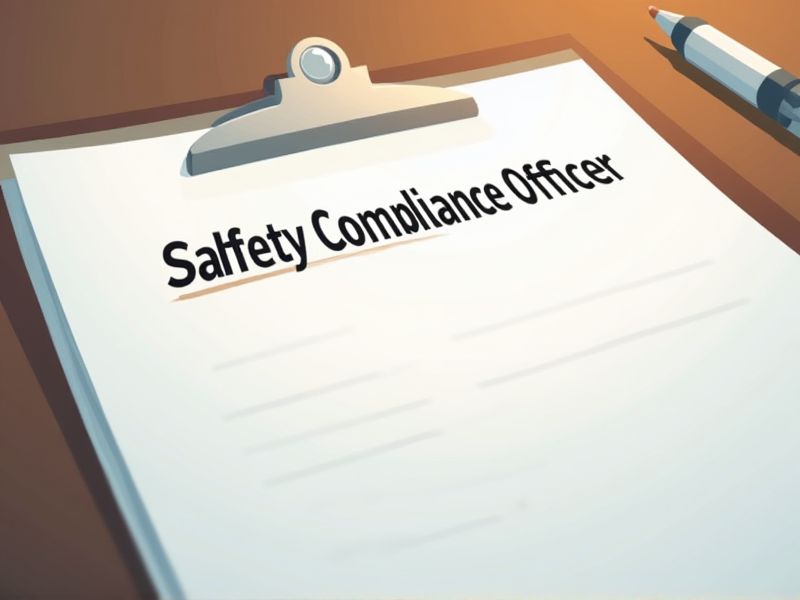
The role of a Safety Compliance Officer requires specialized knowledge to ensure workplace safety standards are met, reducing the risk of accidents and legal liabilities. Certifications validate a professional's expertise and understanding of regulatory frameworks, enhancing the credibility and effectiveness of safety measures. With constantly evolving industry standards, these certifications ensure that officers stay updated on the latest compliance strategies. Here are some essential certifications that might be necessary for a Safety Compliance Officer.
Certified Safety Professional (CSP)
Having a Certified Safety Professional (CSP) designation often ensures that a Safety Compliance Officer possesses advanced knowledge and expertise in managing workplace hazards effectively. Organizations typically rely on CSP-certified individuals to develop and implement comprehensive safety programs, which can lead to a reduction in workplace accidents and associated costs. Regulatory bodies frequently require or recommend CSP certification to demonstrate compliance with safety standards and regulations, fostering a safer work environment. Hiring a CSP-certified Safety Compliance Officer may enhance an organization's reputation for safety, attracting clients and partners who prioritize rigorous safety practices.
Associate Safety Professional (ASP)
The role of an Associate Safety Professional (ASP) ensures that a Safety Compliance Officer stays updated on the latest safety standards and regulations. Earning the ASP credential signifies comprehensive understanding and expertise in occupational safety and health, which enhances the officer's ability to identify and mitigate workplace hazards effectively. An ASP certification fosters credibility and trust among employers and employees, strengthening safety culture within the organization. A certified Safety Compliance Officer can better implement proactive safety strategies, leading to reduced workplace incidents and compliance with all legal obligations.
Construction Health and Safety Technician (CHST)
A Construction Health and Safety Technician (CHST) plays a crucial role in ensuring that safety regulations and standards are accurately implemented on construction sites. Expertise in hazard recognition allows the CHST to identify potential risks, effectively aiding the Safety Compliance Officer in mitigating workplace accidents. Comprehensive understanding of workplace safety laws equips the CHST to guide teams in adhering to legal requirements. By facilitating regular training and updates on safety practices, the CHST supports the Safety Compliance Officer in maintaining a culture of safety compliance.
Certified Industrial Hygienist (CIH)
Certified Industrial Hygienists are needed for Safety Compliance Officers because they possess specialized expertise in identifying and assessing workplace health hazards, ensuring safety compliance. Their training enables them to implement effective control measures to prevent occupational illnesses. They provide technical support and guidance on regulations, aligning safety programs with legal and industry standards. The involvement of a CIH can significantly reduce workplace incidents, enhancing the safety culture within an organization.
NEBOSH National General Certificate in Occupational Health and Safety
The NEBOSH National General Certificate equips Safety Compliance Officers with essential knowledge of occupational health and safety management. As a result, it enhances their ability to identify workplace hazards and implement effective risk controls. This qualification also ensures they meet industry standards for health and safety practices. Consequently, employers often require it to ensure adherence to legal and regulatory requirements.
NEBOSH International General Certificate in Occupational Health and Safety
The NEBOSH International General Certificate provides a comprehensive understanding of health and safety management principles, crucial for a Safety Compliance Officer to effectively identify and mitigate workplace hazards. This certification aligns with global safety standards, ensuring that the officer can apply consistent practices regardless of the industry or geographic location. Employers prefer candidates with this certification as it demonstrates a commitment to professional development and competence in managing safety protocols. With its focus on risk assessment and safety legislation, the certificate equips the officer to implement effective safety policies that reduce the likelihood of workplace incidents.
OSHA 30-Hour General Industry Certification
The OSHA 30-Hour General Industry Certification equips Safety Compliance Officers with comprehensive knowledge of occupational safety standards, fostering a safer workplace. Possession of this certification demonstrates a commitment to regulatory compliance, reducing the risk of workplace incidents. Employers value this credential as it highlights the officer's ability to identify and mitigate potential hazards effectively. This certification also strengthens the officer's credibility when implementing safety protocols and conducting training sessions.
OSHA 30-Hour Construction Industry Certification
The OSHA 30-Hour Construction Industry Certification equips a Safety Compliance Officer with comprehensive knowledge of workplace safety standards. This certification enhances their ability to identify and mitigate potential hazards on construction sites. Holding OSHA certification demonstrates a commitment to maintaining a safe and compliant work environment. It provides credibility and trust, both essential in enforcing safety regulations effectively.
First Aid/CPR/AED Certification
A Safety Compliance Officer must be prepared to respond effectively in emergencies, and First Aid/CPR/AED certification equips them with essential life-saving skills. In environments where accidents or health emergencies can occur, having certified personnel ensures immediate and appropriate care can be provided, potentially reducing harm. Compliance with health and safety regulations often mandates that personnel are trained and certified in these areas to meet legal obligations and standards. Organizations with certified officers demonstrate their commitment to workplace safety, which can enhance trust and reduce liability.
Certified Safety Manager (CSM)
Having a Certified Safety Manager (CSM) credential equips a Safety Compliance Officer with advanced knowledge in safety protocols and risk management, which elevates the overall safety standards within an organization. Employers value a CSM certification as it signifies that the individual not only understands compliance requirements but also has the practical skills to implement effective safety practices. The CSM certification introduces methodologies to proactively identify and mitigate potential hazards before they evolve into significant issues. Integrating a CSM into the workforce often results in reduced incident rates and enhances the company's reputation for prioritizing safety.
Summary
When you obtain certifications as a Safety Compliance Officer, your credibility and expertise in the field are significantly enhanced. Employers tend to value certified professionals more, leading to increased job opportunities and potential for advancement. With certifications, you are also likely to improve workplace safety protocols, demonstrating your commitment to best practices. Certifications often lead to better risk assessment and incident prevention, benefiting both you and your organization.
